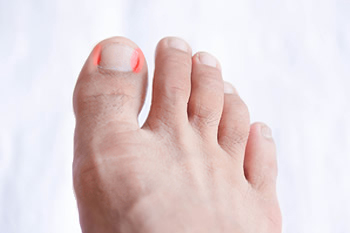 Patients who have had ingrown toenails are often familiar with the pain and discomfort that is often associated with them. It occurs as a result of the edge of the toenail growing into the surrounding skin. This can happen if shoes that are worn do not fit correctly, and the toes may be crammed together. Additionally, this condition may be caused by trimming the toenails in a rounded fashion instead of straight across. Common symptoms that many patients notice are pain around the edge of the toenail, redness, and swelling. Moderate relief can be found when the feet are soaked in warm water, as this will be beneficial in softening the affected area. If it becomes infected, it is strongly advised to seek the counsel of a podiatrist who can properly treat this ailment.
Patients who have had ingrown toenails are often familiar with the pain and discomfort that is often associated with them. It occurs as a result of the edge of the toenail growing into the surrounding skin. This can happen if shoes that are worn do not fit correctly, and the toes may be crammed together. Additionally, this condition may be caused by trimming the toenails in a rounded fashion instead of straight across. Common symptoms that many patients notice are pain around the edge of the toenail, redness, and swelling. Moderate relief can be found when the feet are soaked in warm water, as this will be beneficial in softening the affected area. If it becomes infected, it is strongly advised to seek the counsel of a podiatrist who can properly treat this ailment.
Ingrown toenails may initially present themselves as a minor discomfort, but they may progress into an infection in the skin without proper treatment. For more information about ingrown toenails, contact Dr. Thomas E. Silver of Westwood Foot Clinic. Our doctor can provide the care you need to keep you pain-free and on your feet.
Ingrown Toenails
Ingrown toenails are caused when the corner or side of a toenail grows into the soft flesh surrounding it. They often result in redness, swelling, pain, and in some cases, infection. This condition typically affects the big toe and may recur if it is not treated properly.
Causes
- Improper toenail trimming
- Genetics
- Improper shoe fitting
- Injury from pedicures or nail picking
- Abnormal gait
- Poor hygiene
You are more likely to develop an ingrown toenail if you are obese, have diabetes, arthritis, or have any fungal infection in your nails. Additionally, people who have foot or toe deformities are at a higher risk of developing an ingrown toenail.
Symptoms
Some symptoms of ingrown toenails are redness, swelling, and pain. In rare cases, there may be a yellowish drainage coming from the nail.
Treatment
Ignoring an ingrown toenail can have serious complications. Infections of the nail border can progress to a deeper soft-tissue infection, which can then turn into a bone infection. You should always speak with your podiatrist if you suspect you have an ingrown toenail, especially if you have diabetes or poor circulation.
If you have any questions, please feel free to contact our office located in Golden Valley, MN . We offer the newest diagnostic and treatment technologies for all your foot care needs.
Read more about Ingrown Toenails